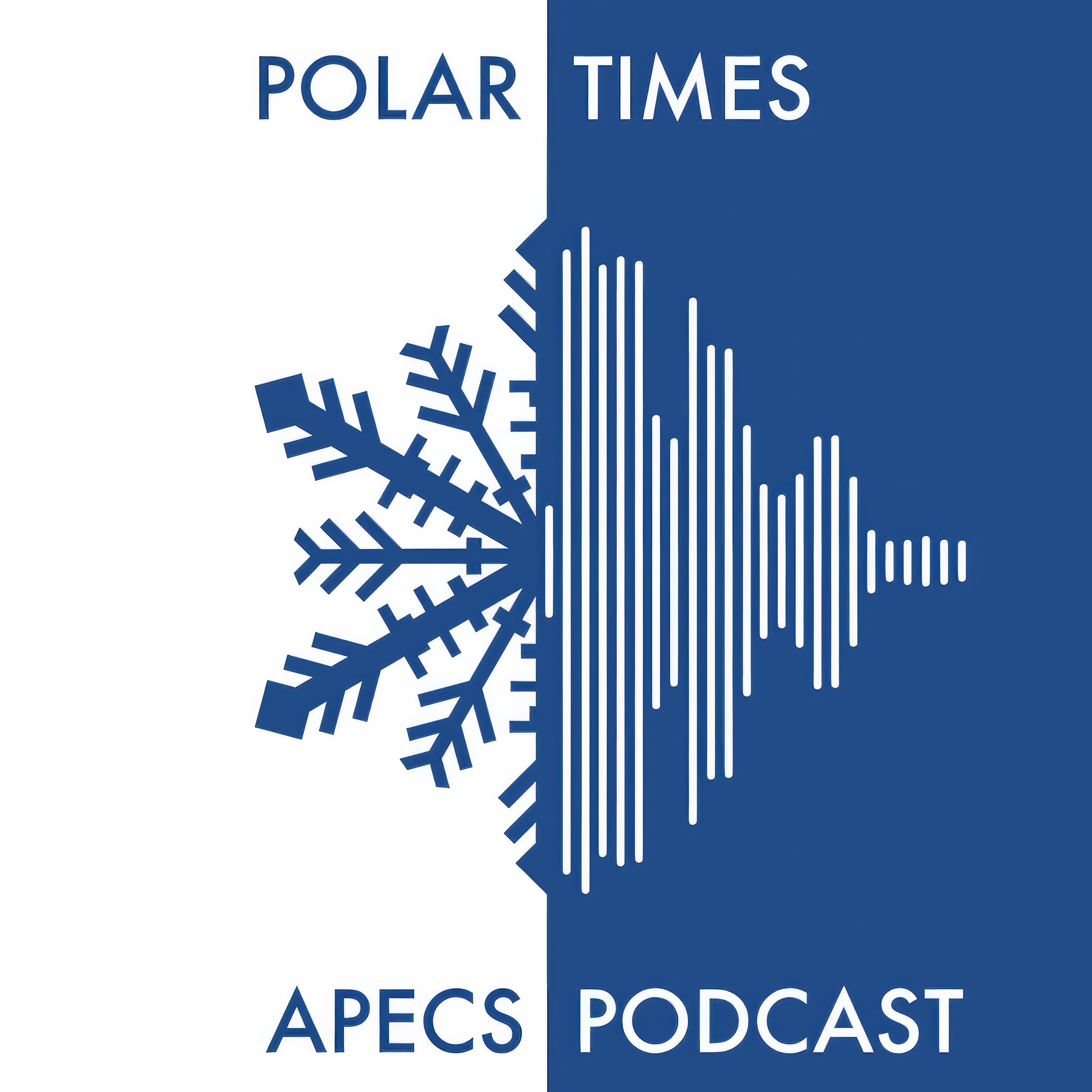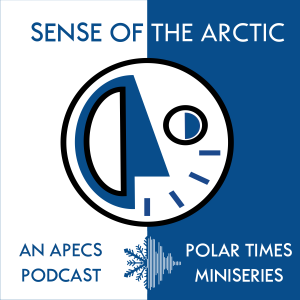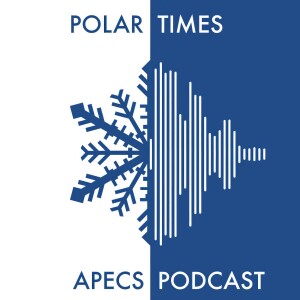
7.8K
Downloads
49
Episodes
Science and stories from literally the coolest places on the planet! It’s said that the poles are the thermometer for the rest of the planet- what happens to the rest of us, has already been happening there for years. It’s easy with the state of the world currently to bunker down in a little private bubble, but its more essential than ever that we broaden our horizons and remember that there’s a world out there that is incredible- and needs us! And if that sounds too heavy for you then instead why not join us to escape as we take to on audial adventures to these strange and remote and beautiful places? We’ll speak to guests who’ve looked polar bears in the eye, who drive 12k ton ships through ice 9ft thick or who spend years doing science with no-one but three other people and thousands of penguins for company! These are Polar Times we live in. Join us, and we’ll take you there! An APECS Production (Association of Polar Early Career Scientists). Music credits: ”Scuba” - Metre Unaltered License: CC BY-NC-SA
Episodes

Friday Aug 25, 2023
Sense of the Arctic: Episode 6
Friday Aug 25, 2023
Friday Aug 25, 2023
Welcome back for the sixth and final episode of Sense of the Arctic, a podcast miniseries from the APECS Science and Diplomacy Project Group in collaboration with the Polar Times.
We round out our series by hopping over to Greenland and chatting with Dr. Gitte Reimer, the rector at the University of Greenland, and Dr. Elizabeth (Beth) Rink, a professor at Montana State University whose research examines sexual and reproductive health in Greenland through community-based participatory research.
The conversation touches on past and current uses of community-based participatory research in Greenland and how the methodology has evolved over the past three decades. We also discuss Gitte's efforts to implement Greenland's recently-released national research policy, which emphasizes the local and nationwide importance of community-based participatory research.
We hope you enjoy this important final episode of Sense of the Arctic!
- Podcast Hosts: Inge Deschepper and Nicholas Parlato
- Edition: Inge Deschepper
- Mastering: Damien Ringeisen
- Cover art by Matthew Nelson, Nicholas Parlato, and Damien Ringeisen
- Music: "Scuba" by Metre, Nul Tiel Records, UK (unaltered) CC BY-NC-SA

Friday Aug 04, 2023
Antarctica on stage
Friday Aug 04, 2023
Friday Aug 04, 2023
-
Podcast Host: Jack Buckingham
-
Edition and Mastering: Damien Ringeisen
-
Cover art by Matthew Nelson
-
Music: "Scuba" by Metre, Nul Tiel Records, UK (unaltered) CC BY-NC-SA

Tuesday Jul 25, 2023
Sense of the Arctic: Episode 5
Tuesday Jul 25, 2023
Tuesday Jul 25, 2023
Welcome back for the fifth episode of Sense of the Arctic, a podcast miniseries from the APECS Science and Diplomacy Project Group in collaboration with the Polar Times.
- Podcast Hosts: Inge Deschepper and Nicholas Parlato
- Edition: Inge Deschepper
- Mastering: Damien Ringeisen
- Cover art by Matthew Nelson, Nicholas Parlato, and Damien Ringeisen
- Music: "Scuba" by Metre, Nul Tiel Records, UK (unaltered) CC BY-NC-SA
![[Bonus] Self-reflective Poetry - Polar Week 2023](https://pbcdn1.podbean.com/imglogo/image-logo/9655313/PT_thumbnail-HR2_300x300.jpg)
Tuesday Apr 04, 2023
[Bonus] Self-reflective Poetry - Polar Week 2023
Tuesday Apr 04, 2023
Tuesday Apr 04, 2023
Hello and welcome back to Polar Times! Today’s episode features self-reflective poems submitted to APECS for the International Polar Week of March 2023.
The poems here are presented by (in order):
-
Marilena Dracea-Chelsoi
- Parnika Gupta
- Sarah Johnson
- Damien Ringeisen
The text of these poems and the other submitted self-reflective poetry are available here, as well as on Twitter (@Polar_Research), Facebook (APECS4u), and Instagram (@apecs.polar).
Technical details:
- Edition and Mastering: Damien Ringeisen
- Cover art by Matthew Nelson
- Music: "Scuba" by Metre, Nul Tiel Records, UK (unaltered) CC BY-NC-SA

Monday Mar 27, 2023
Sense of the Arctic: Episode 4
Monday Mar 27, 2023
Monday Mar 27, 2023
Welcome back for the fourth episode of Sense of the Arctic, a podcast miniseries from the APECS Science and Diplomacy Project Group in collaboration with the Polar Times.
In this episode, we had the pleasure of chatting with Dr. Tero Mustonen, a Finnish researcher at the University of Eastern Finland and the president of SnowChange cooperative. He was also a lead author of the 6th IPCC assessment released in 2021, which had the first attempt at including traditional and indigenous knowledge in the report's findings.
We spoke about winter seining, SnowChange, the past and present impacts of colonisation and the importance and differences of community-driven research in the Northern European context. He also gave some sound advice on how and when to do research in the polar systems.
- SnowChange: http://www.snowchange.org/
As usual, if you would like to get in contact with Polar Times to recommend a guest, volunteer to be a guest, give us some feedback or just ask a question, then you can email us (thesearepolartimes@gmail.com) or tweet APECS @Polar_Research any time- we would love to hear from you.
You can download the episode transcript here: Transcript
Technical details:
- Podcast Hosts: Inge Deschepper and Nicholas Parlato
- Edition: Inge Deschepper
- Mastering: Damien Ringeisen
- Cover art by Matthew Nelson, Nicholas Parlato, and Damien Ringeisen
- Music: "Scuba" by Metre, Nul Tiel Records, UK (unaltered) CC BY-NC-SA

Friday Jan 20, 2023
Sense of the Arctic: Episode 3
Friday Jan 20, 2023
Friday Jan 20, 2023
- Ikaarvik: https://ikaarvik.org/
- ScIQ publication: https://cdnsciencepub.com/doi/full/10.1139/as-2020-0015
As usual, if you would like to get in contact with Polar Times to recommend a guest, volunteer to be a guest, give us some feedback or just ask a question, then you can email us (thesearepolartimes@gmail.com) or tweet APECS @Polar_Research any time- we would love to hear from you.
You can download the episode transcript here: Transcript
Technical details:
- Podcast Hosts: Inge Deschepper and Nicholas Parlato
- Edition: Nicholas Parlato
- Mastering: Damien Ringeisen
- Cover art by Matthew Nelson, Nicholas Parlato, and Damien Ringeisen
- Music: "Scuba" by Metre, Nul Tiel Records, UK (unaltered) CC BY-NC-SA

Friday Dec 02, 2022
Sense of the Arctic: Episode 2
Friday Dec 02, 2022
Friday Dec 02, 2022
*TRIGGER WARNING: discussion of systemic racism and inequality were discussed and may be triggering to those that have experienced similar situations*
Welcome to the second episode of Sense of the Arctic, a podcast miniseries from the APECS Science and Diplomacy Project Group in collaboration with the Polar Times.
This series highlights the importance and implementation of scientific collaboration with Arctic communities through community-based monitoring (CBM), co-production of knowledge, and equitable data management.
Our second guest is Margaret Rudolf, a Ph.D. candidate at the University of Alaska Fairbanks, working at the International Arctic Research Center with the Alaska Center for Climate Assessment and Policy and the Research Networking Activities for Sustained Coordinated Observations of Arctic Change (CoObs RNA). Margaret talked with us about her experiences as an Inupiat woman in the sciences that led her into her current field of research in evaluation and success metrics of Indigenous-led co-production of knowledge and the role of boundary spanners in enhancing scientist-community relations.
Below are some links and references that are mentioned in the podcast that you may be interested in:
- Margaret’s research website: https://uaf-accap.org/research-activities/understanding-coproduction-ak-native-communities/
- https://sites.google.com/view/tektalks/home
- Links to programs mentioned in the podcast:
- Arctic Food Sovereignty Working Group- https://arcticobservingsummit.org/wp-content/uploads/2022/03/AOS2022_poster_P-015.pdf
- https://akcasc.org/wp-content/uploads/2022/02/FSWG-Presentation-2022.pdf
- SAON Roadmap- https://nora.nerc.ac.uk/id/eprint/532146/1/ARCTIC_2021_SAON_Roadmap.pdf
- Arctic PASSION- https://arcticpassion.eu/
As usual, if you would like to get in contact with Polar Times to recommend a guest, volunteer to be a guest, give us some feedback or just ask a question, then you can email us (thesearepolartimes@gmail.com) or tweet APECS @Polar_Research any time- we would love to hear from you.
Podcast Hosts: Inge Deschepper and Nicholas Parlato
Edition: Inge Deschepper
Cover art by Matthew Nelson, Nicholas Parlato, and Damien Ringeisen
Music: "Scuba" by Metre, Nul Tiel Records, UK (unaltered) CC BY-NC-SA

Friday Oct 21, 2022
Sense of the Arctic: Episode 1
Friday Oct 21, 2022
Friday Oct 21, 2022
Welcome to the first episode from the Science and Diplomacy Project Group in collaboration with the Polar Times Team mini-series: Sense of the Arctic
This series highlights the importance and need for collaboration with communities through community based monitoring (CBM) and how it started and has changed over the years.
Our first guest is Dr. Noor Johnson, a research scientist at the National Snow and Ice Data Center (NSIDC) at the University of Colorado, Boulder. She provides us with some information about what CBM is, where it was effectively used, its importance, and how you can start incorporating CBM into your own research.
Below are some links and references that are mentioned in the podcast that you may be interested in:
- Professional Website: https://nsidc.org/about/our-people/Noor_Johnson
- ELOKA: https://eloka-arctic.org/
- SIKU: https://siku.org/about
- SIZONet and AAOKH: https://eloka-arctic.org/sizonet
- Arcticcbm.org
- Graeme Reed, Nicolas D. Brunet, David C. Natcher, 2020, Can indigenous community-based monitoring act as a tool for sustainable self-determination?, The Extractive Industries and Society, Volume 7, Issue 4, Pages 1283-1291, ISSN 2214-790X, https://doi.org/10.1016/j.exis.2020.04.006.
- David C. Natcher, Nicolas D. Brunet, 2020, Extractive resource industries and indigenous community-based monitoring: Cooperation or cooptation?, The Extractive Industries and Society, Volume 7, Issue 4, Pages 1279-1282, ISSN 2214-790X, https://doi.org/10.1016/j.exis.2020.10.005.
- Wilson NJ, Mutter E, Inkster J, Satterfield T. Community-Based Monitoring as the practice of Indigenous governance: A case study of Indigenous-led water quality monitoring in the Yukon River Basin. J Environ Manage. 2018 Mar 15;210:290-298. doi: 10.1016/j.jenvman.2018.01.020. PMID: 29407189.
To contact Dr. Noor Johnson about the book published by Finn Danielsen contact her through the email available on her website.
As usual, if you would like to get in contact with Polar Times to recommend a guest, volunteer to be a guest, give us some feedback or just ask a question then you can email us (thesearepolartimes@gmail.com) or tweet APECS @Polar_Research any time- we would love to hear from you.
Episode edited by Nicholas Parlato and Damien Ringeisen
Cover art by Matthew Nelson, Nicholas Parlato, and Damien Ringeisen
Music: "Scuba" by Metre, Nul Tiel Records, UK (unaltered) CC BY-NC-SA

Friday Jun 03, 2022
Mythical Monsters in the Ground
Friday Jun 03, 2022
Friday Jun 03, 2022
Hello and thank you for tuning in to another episode of Polar Times!
In this episode, our host Henrietta talks to Christie Grekul and Dr Grant Zazulaabout all things Beringia, palaeontology, archaeology and museums. Christie is the Manager of the Yukon Beringia Interpretive Centre and Grant is Manager of the Yukon Government Palaeontology Program. They both live and work in city of Whitehorse in the Canadian Yukon, and between them know everything there is to know about Beringia–the land bridge that once connected Siberia to the Yukon. Staytuned for mammoth fossils, a mummified wolf pup, and to find out what Thomas Jefferson has to do with giant ground sloths...
To learn more about the Yukon Beringia Interpretive Centre and their amazing science-communication work, visit their website here: https://www.beringia.com/
If you have anything you’d like to tell us, no matter how big or small, please get in touch via email (therearepolartimes@gmail.com) or tweet APECS (@Polar_Research). We’d love to hear from you!
Episode edited by Damien Ringeisen
Cover art by Matthew Nelson
Music: “Scuba” by Metre, Nul Tiel Records, UK (unaltered) CC BY-NC-SA

Friday Apr 22, 2022
The Life Aquatic
Friday Apr 22, 2022
Friday Apr 22, 2022
Hello and welcome back to Polar Times! On today’s episode we are excited to welcome Pierre Coupel, oceanographer, biogeochemist and documentary maker for ArctiConnexion, currently based in Canada!
Post-PhD, Pierre has been fortunate enough to participate in many field seasons and chats to Jack all about life at ice camps and on board research vessels from several nations. From Chinese icebreakers to the salt pans of Bolivia, we talk travel, how this led to an exploration of his love for film-making, how this led to the decision to leave academia, and how these two talents (science and cinema!) come together in his current position at ArctiConnexion. We then talk all about his current work as well as his past documentary endeavours. ArctiConnexion is an organisation which aims “to support, through mentorship and knowledge sharing, indigenous communities in the development of local competencies and leadership for research and applications promoting community well-being.”
We’ve talked on Polar Times before about the power of the picture when it comes to science communication, and yes we’re going to revisit it again because creative scicomm is obviously something that we can’t get enough of!
If you would like to see Pierre’s winning photo, follow this link:
https://www.apecs.is/component/phocagallery/category/34-category-research.html?Itemid=392
If you would like to see his body of other work then go here:
https://pierrecoupel.wixsite.com/life-patchwork
Or check out his Instagram: https://www.instagram.com/pierre_coupel/
Finally, for ArctiConnexion, here’s the tea:
https://arcticonnexion.ca/mission/
Episode edited by Damien Ringeisen
Cover art by Matthew Nelson
Music: "Scuba" by Metre, Nul Tiel Records, UK (unaltered) CC BY-NC-SA
